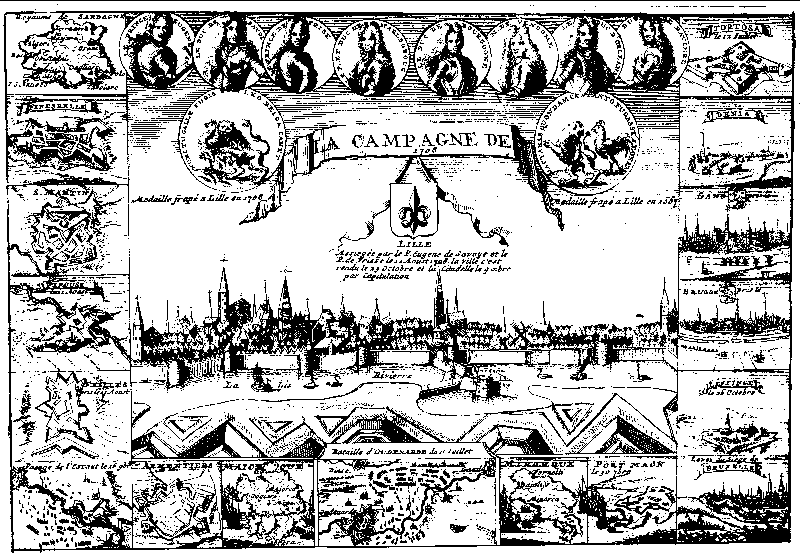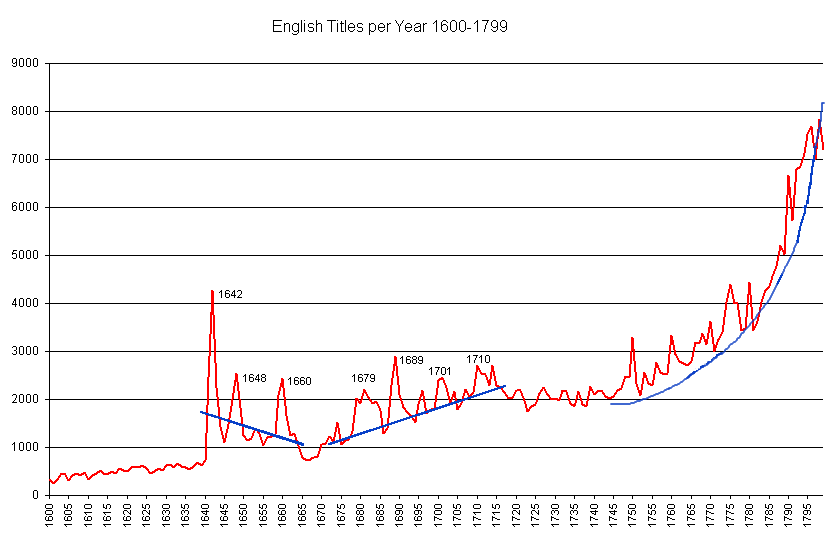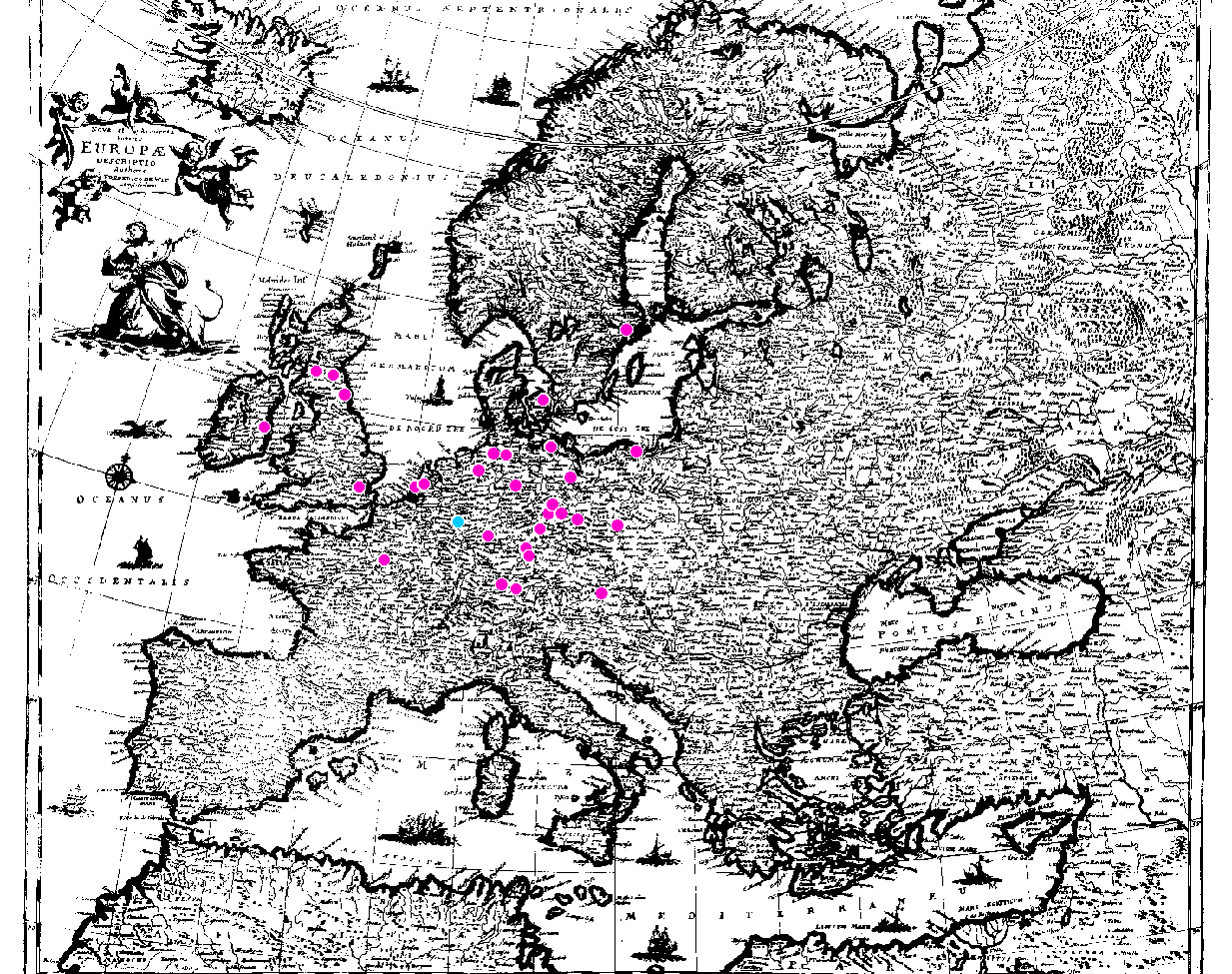| |
The English Easter Term Catalogue for 1711 listed the production London's publishers were trying to sell, arranged under the headings "Divinity" (50%), "History and Politicks" (20%), "Mathematical Sciences", "Physical and Natural Philosophy" (9.5%), "Philology" (11.6%), "Poetry" (5.3%) and "Miscellanies" (18.9%). Most of the categories were subdivided further into new books and reprinted materials. In the fields of "Divinity" and "History and Politicks", this served to mark out those publications which potentially made contributions to current debates - 56% of the production #?# constituted to the current affairs in the fields where public discourses prevailed#?#. Novels could appear under "Poetry" - if they were among the classics of the field. More generally, however, they ranked under "History and Politicks" though without finding a unfied space there.
The German term catalogue for easter 1711 was different. Instead of stressing the demarcation between new and old materials it stressed the line between the truly academic production in Latin and the growing production in the vernacular (45%). Instead of opening with the fields of public discourse the German term catalogue laid its emphasis on the production of the academic world: Theology (45%), Law (11%) and Medicine (6%) came first. "History and Philosophy" followed only then - including poetry and prose fiction without any subcategorisation in the field of "German historical and philosophical books" - "German" referring to the language one read, not to the fact that these productions were actually of German origin. 
Neither the English nor the German market showed the national traditions modern historians of literature carefully observe. Literature in our modern sense - a field of prose fiction, drama and poetry did not exist on the early 18th century book market, the scattered production preceding the modern literary production amounted to a few percent. Theology and "literature" in the early 18th century sense (of academic learning) dominated the production. History and politics added to the output of the printing presses, a field able to outweigh both learned productions if one included newspapers and journals.
Poetry and prose fiction made up less than ten percent of the market throughout Europe. The main reason for this was that the field did not function in any way as literature functions in our modern societies. The nations did not have compulsory education systems with state schools teaching the plays, novels, and poems of the greatest national authors. The media did not review these materials nor were they part of the commercial market flourishing through the interaction of the publishers, literary critics, #notorious# illustrious authors, state ministries concerned with the national canon of "literature", and Nobel Prize Commitees deciding whom to number among the leading literary voices of the world.
Poetry and fiction made up a few percent of the book market, but on the other hand, in a manner quite incomprehensible today, they pervaded both the most serious discourses and every day life. Poets wrote for funerals, weddings, jubilees - not only to praise monarchs. Regular citizens ordered their services to see a hundred copies of a funeral cantata printed for the occasion. Serious books would open with prefatory poems. Critics complained about the ominpresence of versified language produced by professional poets who prostituted what would otherwise have been an art. Prose fiction stood outside - poetry was mainly language in verse - yet it pervaded the market in its own way with curious stories told by sober historians to entertain their audiences, if necessary, in the midst of the driest accounts. A line between true history and fiction was especially difficult to draw, for inventions were cropping up in the most elegant contemporary histories wherever authors felt they might save their necks by introducing them - so as to be able later to claim that the whole piece was fiction, sheer "romance", full of inventions, hardly worth the scandal it created.
The markets of poetry and prose ficton were overtly scandalous. The opera was perceived as the realm where poetry reached its utmost beauty, the very harmony inviting music. The opera houses were at the same time a realm of scandalous court- and city-life with a cult of European opera stars ravishing the public and the rulers of Europe. Prose fiction was scandalous, if seen as a tissue of lies. It was even more scandalous, if seen as a reformed practice which had now #?#entered# the European Chronique scandaleuse as a fully accepted field of modern history, necessary to be written wherever things could not be said in more direct terms.
Literary critics had often called for better poetry to be written - without success. The situation changed in the 1730s and 1750s with learned journals now becoming a platform on which poetry and ficton, the "belles lettres", could be sold if the productions refrained from scandal and if they aimed at truly artful fictions. What we today read as literature was constructed in the mid 18th century in an attempt to come to terms with the scandalous market the late 17th and early 18th centuries had produced.
The situation in the early 18th century is the situation shortly before the rise of "literature" in the new sense of the word. It offered poetry and prose fiction mostly produced by authors who celebrated their anonymity and their lack of responsibility as a form of "gallantry" to be displayed. The development would ultimately lead into a reform movement producing authors who became representatives of the nation's literary life, yet only few authors anticipated this development at the beginning of the 18th century.
Bearing these differences in mind one might understand why early 18th century novelists felt at home in the field of "history and politics" rather than in the field of "literature" on which our modern histories of literature focus. Many of these novels include songs and operas - poetry in the early 18th century sense. With the exception of a few works we have learned in retrospect to discuss, all these works are still hardly ready to be discussed. They appear strangely superficial where we expect deeper meanings to be decoded and assessed. The early 18th century produced its own vast array of reviews and discussions dealing with literature - they dealt with "literature" in the old sense of the word: with theology, law, medicince, philology and history and scarcely touched a work of poesy or fiction. Those who wrote poetry and fiction, on the other hand, for the moment did very little to change this situation and to attract substantial criticism. They rejoiced in a freedom their market was about to lose, and cared particularly little about aestehics and the national traditions we would like to investigate.
|
|


